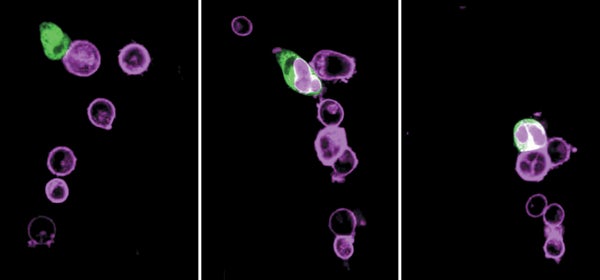Cannibal Cells Inspire Cancer Treatment Improvement
Giving cells an appetite for cancer could enhance treatments
Macrophage (green) consuming cancer cells.
From “Hyperactive Rac Stimulates Cannibalism of Living Target Cells and Enhances CAR-M-Mediated Cancer Cell Killing,” by Abhinava K. Mishra et al., in Cell Biology; December, 2023.
In living organisms, some cells ruthlessly gobble up others. This “cellular cannibalism” is a common natural process: within your own body, white blood cells are consuming millions of old red blood cells this second. New research published in the Proceedings of the National Academy of Sciences USA suggests that using a group of genes to stimulate such cannibalistic behavior could improve a novel cancer immunotherapy.
The idea started when biologist Denise J. Montell, senior author of the new paper, and her colleagues noticed that hyperactivated forms of genes in the Rac family, which help cells envelop things they’re attempting to ingest, were causing tissue death in fruit fly embryos. It turned out that the modified genes make cells consume their neighbors in “a feeding frenzy,” Montell says. Humans have their own versions of these genes, called RAC, and Montell wondered whether they might help her new colleague Meghan Morrissey at the University of California, Santa Barbara, with her work on the cancer immunotherapy CAR-M.
CAR-M, which is currently in early-stage human trials, focuses on macrophages: white blood cells that naturally engulf harmful substances but are typically useless against cancers. CAR-M involves collecting a patient’s macrophages (M) and genetically engineering them to add proteins called chimeric antigen receptors (CAR), which let the macrophages recognize cancer cells. The macrophages are then put back into the patient, where the engineered cells should hunt down and consume cancers. A related immunotherapy already in use is most effective for blood cancers; researchers…
Read the full article here







